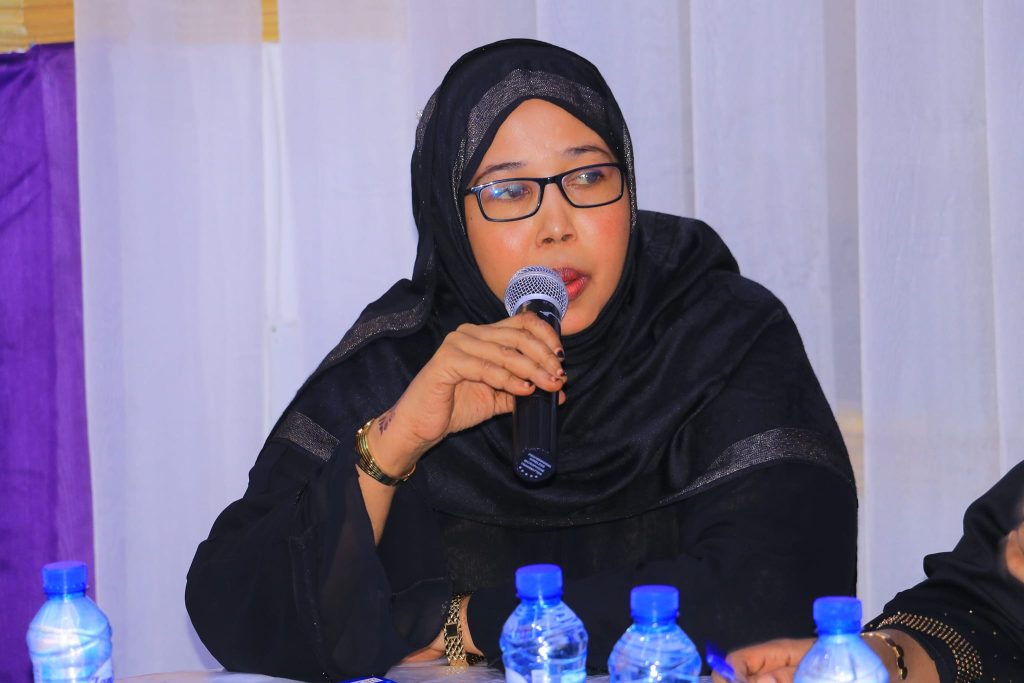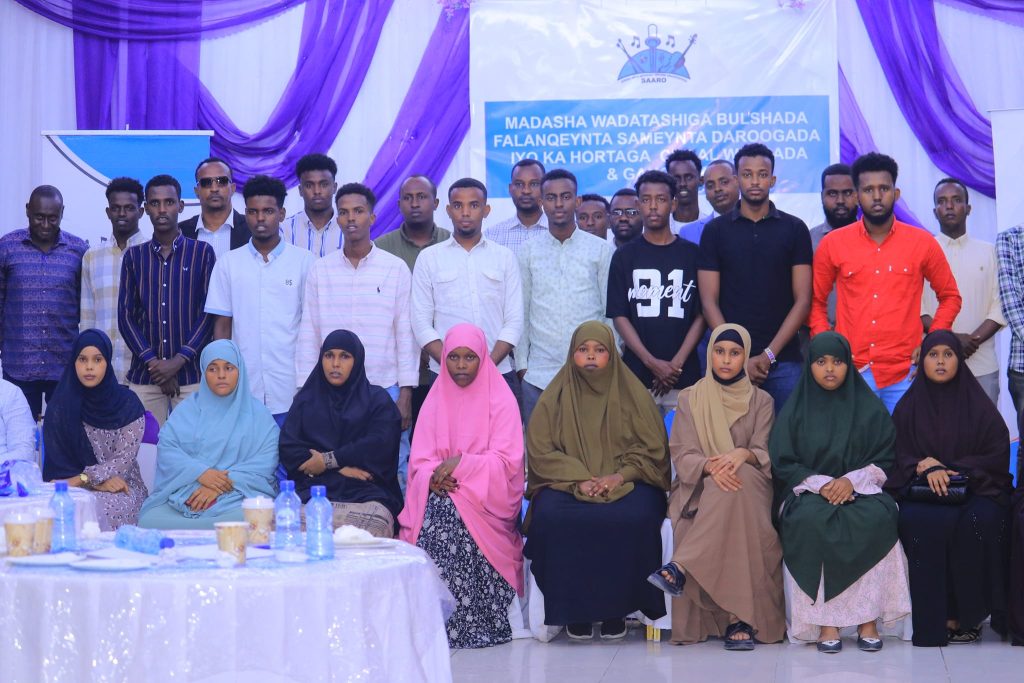Date: 26 October 2025
Executive Summary
This policy brief presents the definitive findings of a six-month ground research investigation by SAARO into technology-facilitated gender-based violence (TFGBV) in Somalia. Conducted across key urban centers in South-Central Somalia, this research establishes that digital platforms are being systematically weaponized to harass, threaten, and silence Somali women. This coordinated abuse directly reverses the significant social and political gains made by women in recent years. SAARO’s evidence outlines the specific mechanisms of this threat, its devastating impacts on individuals and civil society, and provides the following non-negotiable recommendations for government bodies, tech companies, and international partners to secure a safe digital environment for Somali women.
- Introduction: The SAARO Ground Research Investigation
In 2025, SAARO initiated the “Digital Spaces, Real Threats” research project to convert growing anecdotal evidence of online abuse into empirical data. This brief is the direct product of that systematic investigation, designed to inform and compel urgent policy action.
Research Methodology:
SAARO employed a mixed-methods approach to ensure comprehensive data collection and validation between April and September 2025.
- Confidential Interviews:25 in-depth interviews with Somali women victims of targeted online harassment, including journalists, politicians, entrepreneurs, and civil society activists.
- Focus Group Discussions (FGDs):4 FGDs held in Mogadishu, Jowhar, and Baidoa to map the pervasive nature of these threats across different communities.
- Stakeholder Consultations:Direct consultations with the Ministries of Women and Human Rights, telecommunications regulators, and local cybersecurity experts.
- Case Study Analysis:In-depth documentation and forensic analysis of 12 severe cases of digital threat, including doxing, blackmail, and impersonation.
- Key Findings: The Digital Threat Ecosystem
SAARO’s research categorizes the digital threats into three distinct tiers of escalation.
Tier 1: Psychological Harassment and Public Shaming
This widespread form of attack inflicts emotional distress and damages reputations to enforce social control.
- Organized Trolling:Women in public life consistently face coordinated campaigns of hate speech, derogatory insults, and misogynistic content on Facebook, WhatsApp, and Instagram.
- Moral Policing:Women’s online expressions are met with accusations of violating cultural or religious norms, a deliberate tactic to exclude them from public discourse.
Tier 2: Doxing and Impersonation
These attacks create direct threats to physical safety and security.
- Doxing:A standard tactic against activists and politicians. Perpetrators maliciously publish private phone numbers, home addresses, and family details, leading to offline harassment and, in documented cases, family ostracization.
- Fake Accounts:Perpetrators create impersonation accounts to post defamatory content or perpetrate fraud, deliberately destroying the victim’s social and professional reputation.
Tier 3: Financial Blackmail and Extortion (“Sextortion”)
This is the most severe and rapidly growing threat identified by SAARO.
- The Modus Operandi:Perpetrators use false identities on WhatsApp or Telegram to build trust and coerce women into sharing intimate media.
- The Blackmail:The perpetrator then threatens to publicize the material unless the victim pays a ransom, typically between $1,000 and $10,000.
- The Outcome:This results in financial ruin, severe social ostracization, elevated risk of honor-based violence, and profound psychological trauma, forcing many victims to abandon their careers.
- The Documented Impact
The consequences of these digital attacks are tangible and severe, creating a chilling effect on Somalia’s social and political progress.
- Silencing of Women’s Voices:The vast majority of interviewed women now self-censor their online activity. Many have considered leaving public life, directly undermining democratic participation and governance.
- Mental Health Crisis:Victims under our study present with acute anxiety, depression, and post-traumatic stress disorder (PTSD). The current support infrastructure is incapable of addressing this trauma.
- Economic Disempowerment:Female entrepreneurs face reputational damage harming their businesses, while blackmail victims suffer catastrophic financial losses.
- Erosion of Digital Potential:The digital space, a vital tool for connection and economic empowerment, is being transformed into a domain of fear for Somali women.
- The Institutional Protection Gap
SAARO’s investigation identifies critical systemic failures that create a crisis of impunity for perpetrators.
- Inadequate Legal Frameworks:Existing cybercrime legislation remains underdeveloped and is not enforced with a gender-sensitive approach. The legal system does not yet fully recognize or prioritize digital evidence in cases of TFGBV.
- Law Enforcement Deficit:Police and judiciary lack the specialized training and digital forensic capacity to investigate these crimes. A prevalent tendency is to minimize online threats as insignificant or to assign blame to the victim.
- Tech Company Negligence:Global social media platforms provide ineffective content moderation for Somali and Arabic languages. Reporting mechanisms are slow, opaque, and unresponsive, allowing harmful content to remain active for prolonged periods.
- Cultural Stigma:The profound shame associated with these attacks, particularly sextortion, enforces a culture of silence that protects perpetrators and prevents victims from seeking justice or support.
- SAARO’s Policy Recommendations
Based on its empirical findings, SAARO mandates the following coordinated actions.
For the Federal Government of Somalia and Regional States:
- Criminalize TFGBV:Explicitly amend the Somali Penal Code to criminalize Technology-Facilitated Gender-Based Violence, including doxing, online threats, and the non-consensual sharing of intimate images.
- Establish Specialized Cybercrime Units:Create and resource dedicated, gender-sensitive cybercrime units within the Somali Police Force, equipped with digital forensic capabilities and a mandate to support survivors.
- Launch a National Awareness Campaign:Fund and execute a public campaign on digital safety, legal rights online, and the support available to victims of digital violence.
For Technology and Social Media Companies:
- Deploy Somali-Language Moderation:Immediately invest in and implement robust content moderation systems, including AI and human reviewers, proficient in Somali and Arabic.
- Create High-Risk User Protocols:Establish expedited, transparent, and effective reporting channels for Somali women journalists, politicians, activists, and other high-risk users.
- Formalize Local Partnerships:Collaborate directly with SAARO and other Somali civil society organizations to develop context-specific safety policies, tools, and response mechanisms.
For Civil Society and International Partners:
- Fund Digital Safety Training:Scale up practical digital hygiene, security, and counter-narrative training programs for women and girls across Somalia.
- Expand Mental Health Support:Establish confidential, free, and specialized psychosocial support services for victims of online violence, integrated with existing GBV response structures.
- Support Evidence-Based Advocacy:Continue to fund local, ground-level research to monitor this evolving issue, evaluate interventions, and hold all stakeholders accountable.
- Conclusion
The digital sphere has become a critical battleground for the rights and safety of Somali women. The threats documented in this SAARO investigation are not virtual; they are causing severe, measurable harm to individuals, fracturing communities, and impeding the progression of Somali society. This is not a future risk but a present crisis, demanding an immediate and decisive response.
The recommendations outlined herein provide a clear and actionable roadmap. SAARO asserts that a coordinated response from government, industry, and the international community is an urgent imperative. The safety, dignity, and fundamental rights of Somali women—and the digital future of the nation—depend on the actions we take today




